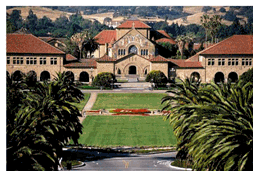|
|
|
|
|
|
|
News & Views item - February 2009 |
![]() Stanford's Tuition Hike Matches Harvard's -- Financial Assistance to Compensate.
(February 26, 2007)
Stanford's Tuition Hike Matches Harvard's -- Financial Assistance to Compensate.
(February 26, 2007)
 Last
week TFW reported that Harvard University was to raise its undergraduate tuition
3.5% to US$33,696 (A$52,530) and the total annual cost of a Harvard education –
including room and board – to US$48,868 (A$76,170), but the university will also
increase need-based scholarships by 18%.
Last
week TFW reported that Harvard University was to raise its undergraduate tuition
3.5% to US$33,696 (A$52,530) and the total annual cost of a Harvard education –
including room and board – to US$48,868 (A$76,170), but the university will also
increase need-based scholarships by 18%.
Now Stanford University is to follow suit releasing a statement that:
The Stanford University Board of Trustees has approved a 3.5 percent increase in total undergraduate charges—tuition, room and board—for the 2009-10 academic year.
Stanford, which will raise total undergraduate fees to US$48,843 next year, remains committed to its new financial aid program that guarantees free tuition to families making less than US$100,000, despite impending budget shortfalls linked to a steep decline in its endowment.
Undergraduate tuition will increase next year to US$37,380, compared with US$36,030 this year; room and board fees will rise to US$11,463, compared with US$11,182 this year.
"The tuition increase will not affect any undergraduate receiving financial aid," Provost John Etchemendy said... following the Board of Trustees meeting.
The university said as well that families making less than US$60,000 a year are not expected to pay tuition or contribute to the costs of room and board and other expenses. The program also eliminated the need for student loans. Students are expected to contribute their earnings from work during the summer and the academic year.
Leslie Hume, chair of Stanford's Board of Trustees said that Stanford had to provide more financial aid to families this year than it had earlier anticipated, as the national and global economic downturn took its toll on families.
The university, which had planned to spend US$97 million this year on financial aid, is now expected to spend about US$102 million.
Stanford is one of the private universities with an undergraduate "need-blind" admission policy for U.S. citizens and permanent residents. It guarantees that students will be accepted regardless of their ability to pay—and will be offered the financial help they need to attend Stanford.
In the 2007-08 academic year, Stanford provided US$75 million in need-based scholarships from university sources. Next year, the university anticipates spending about US$110 million in need-based scholarships, a 47 percent rise over 2007-08.
And in the meantime The Times Higher Education Supplement's John Gill reports: "After six weeks spent digesting Australia's most comprehensive review of higher education in recent times, the country's elite [Group of Eight] universities have branded it a "road map to mediocrity".
And the Minister for Innovation, Industry, Science and Research continues to obsess over his wasteful Excellence in Research for Australia fantasy.